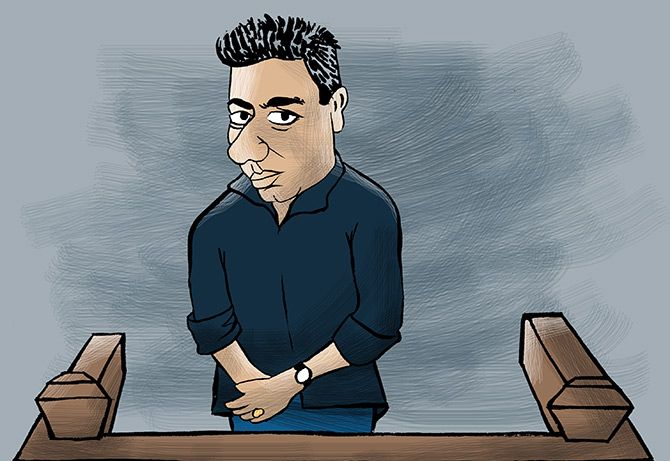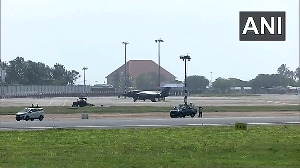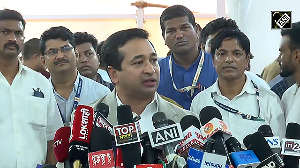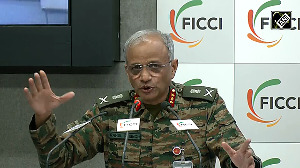The 25 odd witnesses that so far had given testimony had not come up with anything incriminating against Peter or the way Shivade characterised it -- "not even a whisper."
Vaihayasi Pande Daniel reports from the Sheena Bora murder trial.
Illustration: Uttam Ghosh/Rediff.com

Peter and Indrani Mukherjea's pal -- he called himself a "family friend" -- Pritul Sanghavi, 48, took the witness stand for the second time on Monday, January 7, in Courtroom 51 in the Sheena Bora murder trial.
A gentle-mannered, soft-spoken but articulate man, of nearly six foot height who towered out of the box, Sanghavi stood angled towards Indrani's trial lawyer Sudeep Ratnamberdutt Pasbola, listening attentively and gravely to the questions put to him during his cross-examination.
And Pasbola bombarded him, sometimes gruffly, in quick succession with upwards of 130 questions over two hours at the Mumbai city civil and sessions court, Kala Ghoda, constructing in the bargain a fairly clear portrait of who Sanghavi was and his personal footing with Peter and Indrani Mukerjea, who were once his bosses and he was once Indrani's landlord.
No matter who the witness is, when Pasbola is in his distinctive cross-examination mode it is all very clear how the interaction will proceed.
The witness will summarily be ushered back to his school/college examination days and Pasbola will be the professor and the unlucky witness the student.
The witness, who ought to be semi-quaking in his shoes, will be ticked off and brought into line by the no-nonsense Professor Pasbola, of gravelly voice and possessing easily-summoned irritation, who will pull up his pupil multiple times for not listening to the question properly. Or answering it inadequately. Or for having forgotten his 'study portion' when a meek I-don't-know is offered up.
Pasbola will repeat an answer he has received from a witness incredulously and the thunderous disbelief in his voice might hastily goad the witness into revising his answer.
The professor-student session with Sanghavi got off to an even start on Monday.
Sanghavi vigilantly and methodically replied to each of Pasbola's queries, taking care to ensure that his answers were as precise as possible.
He didn't ever lose his equanimity, which he seemed to have a lot of. Or his cool, batting down the questions in a measured way, like each of them were fast balls and he was Cheteshwar Pujara at the crease.
Certain aspects of the picture that emerged through Pasbola's efforts were critical.
Sanghavi, wearing a blue shirt, jeans and white trainers (and one ring less) on Monday, had not been interrogated by the Khar police station, north west Mumbai, that initially handled the case.
He had been brought onto the scene after the CBI took over the investigation and had been questioned in early 2016 on one occasion.
Why had the CBI felt it necessary to introduce him as a witness?
Sanghavi, who had worked at the Mukerjeas's INX Services and INX Executive Search for over eight years, runs a recruitment and management firm named Anekin Management Consultants Pvt Ltd. It has an insurance advisors recruitment division called Bima Business, which has an office at Koregaon Park, Pune, and at Vile Parle East, north west Mumbai.
Pasbola enquired about the landline numbers Bima's Vile Parle office owned and seemed satisfied with the answers he received.
And then Sameer Buddha's name came up.
Periodically, Buddha, a security officer by profession and the brother of Sohail Buddha, a former Mumbai police officer and former Star India employee (the company Peter helmed), has made an entry at odd, you-can-hear-the-penny-drop moments, ever since this trial began in February 2017, in the cross examinations of some of the 25 plus witnesses who have given their testimony till date.
Pasbola wanted to know if Sanghavi knew Buddha.
Sanghavi: "Yes, he was a colleague."
Pasbola: "Was he in any way connected with Anekin Management Consultants? Part-time (capacity)? A consultant?"
Sanghavi emphatically: "No. No."
Pasbola dredged around a bit further to uncover what Sanghavi knew about Buddha.
Did he know when Buddha had started work at INX or the nature of his work and his designation?
Had he been aware that Buddha's brother was Sohail?
Sanghavi's answers while not exactly disdainful hinted that somehow and for whatever reason he did not hold Buddha in any special regard.
Pasbola: "Were you friendly with Mr Buddha?"
Sanghavi: "As a colleague, yes."
After a pause, he qualified, "Friendly. Not very friendly."
His peculiar down-tilting eyes crinkled and a slow, shadowy smile emerged that CBI Special Judge Jayendra Chandrasen Jagdale also observed curiously.
Had Sanghvi known the Mukerjeas's driver Shyamvar Pinturam Rai, Accused No 3 and approver?
Had he had any interaction with Rai ever since he left INX?
Sanghavi said he had not.
Pasbola: "Between January 5, 2012 and May 8, 2012 there were seven calls made from your office's (Bima) landline to Shyamvar Rai's mobile..."
Sanghavi started to reply.
Pasbola sternly, scolding him, "I am not asking you a question yet. Listen very carefully. You had made such calls?"
Sanghavi in a definite tone: "No."
"In your office was there anyone who knew Shyamvar Rai?"
Sanghavi thought for less than a second and said, "Yes. Two people. Fazal Mogul. Nagma Kamran."
Later he revised that to say that four of the employees at his office were originally from INX and would have known Rai.
A few questions later, Pasbola solemnly queried: "Do you know that on April 24, 2012 (the day Sheena was murdered), at 1.47 pm and 1.53 pm two long calls were made of 365 seconds and 386 seconds to Shyamvar Rai from your office?"
Sanghavi equally sombrely: "No. I have not made them."
Pasbola loudly and angrily exploded: "Someone was making the calls!"
His accusation startled Sanghavi.
CBI Special Prosecutor Bharat B Badami interceded and turned to Pasbola: "Shanti."
Judge Jagdale echoed: "Shanti."
Badami to Sanghavi: "Look that side. Don't look at him."
Pasbola truly puzzled: "I can't raise my voice?!"
The judge specified: "Not to the witness. A witness is a guest of the court."
Badami again suggested to Sanghavi that he needn't look at Pasbola.
Pasbola demanded, bristling: "What is this? I can't talk to the witness?"
Judge Jagdale tendered further words of advice to calm Pasbola and concluded with: "He has taken an oath to tell the truth."
Badami, who deliberately attempts to shake up things with his humour, came back with a reply that stumped the judge, the witness and everyone else: "I don't know what oath and all."
At that moment, Indrani, swathed entirely in white, raised her hand and Pasbola was notified that his client wished to speak to him.
Pasbola: "Kai zala? (What happened??)" and Indrani scurried to the front to murmur something to him and her other lawyer Gunjan Mangla.
The advocate turned his line of questioning, maybe after Indrani's whispered suggestions, to Sanghavi's encounters with Sheena.
He dwelled for a long while -- over about 20 to 25 questions -- on the visit Sanghavi had apparently made to a Khar Danda building, north west Mumbai, in 2008 (which he described in his testimony on Thursday) at the behest of one or both of the Mukerjeas to help them "separate" Sheena (then 21) and Rahul Mukerjea, Peter's second son from his first marriage, with whom Sheena was in a relationship with. They were apparently living together in a flat at this Khar Danda address.
Sanghavi had said on Thursday that the Mukerjeas were able to break up the relationship and Peter had taken Rahul home that day and Indrani took Sheena.
When Pasbola narrowly grilled Sanghavi on the actual details of that incident, his facts were vague and he had little or no first-hand information -- be it the dates, the place, the building, the address.
It transpired that he had not actually even seen Sheena leave with Indrani or Rahul depart with Peter, as said in his testimony.
The cross-examination moved on to what Sanghavi knew about what could only be described as Sheena's various bordering-on-wild exploits. After moving to Mumbai from Guwahati or perhaps it was Delhi, Indrani's eldest child had moved in as a PG into a flat at Churchgate, south Mumbai, along with INX employee Radhika Radia and another woman named Vibhuti.
Sanghavi had visited the Churchgate flat a couple of times to meet Radhika. He agreed that the topic of Sheena's relationship with Rahul had figured as conversation between him and Radhika and/or Indrani and Peter.
Pasbola: "Would it be correct to say that Sheena was missing from the PG of Radhika for about three weeks?"
Sanghavi, with an apologetic smile: "I don't remember."
Pasbola: "Would it be correct to say that Sheena was seen in a nightclub with Rahul and they were snorting (Pasbola fumbled for the name of the drug) cocaine?"
Sanghavi tersely: "Yes."
At the back, Indrani, on her feet, added sharply: "Yes!"
The judge, while dictating this answer to the court stenographer, stumbled with the terminology and looked at the lawyer: "Snort?"
Pasbola explained in Marathi: "Nakatoon ghetat (stuff up the nose)." Discreet smiles erupted in the courtroom.
The lawyer further queried: "Would it be correct to say that Sheena was staying with Rahul and falsely telling them (Radhika and Vibhuti) that she was staying at Marlow preparing for examinations?"
Sanghavi said he did not remember
Pasbola: "Would it be correct to say that as a family friend you immediately brought this (the cocaine incident) to the notice of Indrani and Peter?"
Sanghavi confirmed forcefully that he had.
Pasbola: "And upon being informed Indrani was concerned with the welfare of Sheena?"
Sanghavi agreed.
A few questions later, Pasbola asked: "Sheena and Rahul were related by the marriage of Indrani and Peter. Therefore, it was not proper on their part to have any relationship?"
Sanghavi: "Yes."
Indrani, often acting as her own lawyer, was on her feet again in the accused box at the back and nodded her head vigorously and uttered a loud: "Yes."
Judge Jagdale to Sanghavi: "It is your opinion?" He later added: "They have no real sister-brother connection?"
Pasbola concurred: "Technically." Getting highfalutin, he announced: "No consanguinity."
Peter's lawyer Shrikant Shivade went into an explanation that each family had its own mores/"standards" and views of what they considered acceptable.
Judge Jagdale: "60, 70 years ago (maybe I can understand). But this has happened now" and he added that morals in India had modernised considerably.
Both Peter and Indrani listened to him carefully, although at the back probably very little of the judge's gentle observation would have been audible.
After another dozen to two dozen more questions, Pasbola wound up his cross-examination levelling a few accusations at Sanghavi. He charged that Indrani had never introduced Sheena to him as her sister (as said in the testimony on Thursday).
That Sanghavi has never been to Khar Danda that day in 2008 and that the whole incident had been fabricated entirely.
Sanghavi's face broke into a big smile. He looked unbelievingly at Pasbola and then at Badami.
Pasbola declared that Sheena was not living with Rahul at Khar Danda in 2008.
Sanghavi: "I disagree."
Finally, Pasbola stated dramatically: "I put it to you that Sameer Buddha was using your office landline to make calls."
He went on to add that Rai received calls from Buddha at the Bima Business office and "Mr Sanghavi you are falsely deposing that there were other employees who knew Shyamvar Rai."
Sanghavi, looking none too surprised, digested the last charges silently.
Shivade took over the cross-examination some five minutes later.
He had about five questions for Sanghavi.
Shivade: "Is it correct to say that Rahul was not earning or employed anywhere at that given time?"
Sanghavi agreed.
Shivade: "This was the main reason why Peter (was against Rahul's relationship with Sheena)?"
Sanghavi: "Yes, if there were any other reasons I don't know."
Shivade: "That was the main reason. Peter wanted Rahul to get settled in life first."
Sanghavi said that that was maybe one of the reasons and he didn't know of any other.
A question or two later, Pritul Sanghavi was done and the cross examination came to an end.
Sanghavi once again requested permission to meet the Mukerjeas at the back of the courtroom. He was given a few minutes with them. Sanghavi hugged both Indrani and Peter and they look delighted to see him and they spent about five minutes catching up.
He showed a few pictures on his phone to the couple too and then the CBI representative, the mutton-chop whiskered Durga Singh Bisht, escorted Sanghavi out.
Meanwhile, up front, Badami and Shivade and Mangla began bickering about not having received the name of the next witness, who would be produced on January 11.
Shivade: "The witness list is already known. If someone wanted to tamper with the witnesses they could have tampered long ago. This is not a TADA or MCOCA case where the names of witnesses are secret."
The judge told Badami that he had received an order from the chief justice of the Bombay high court that all CBI cases had to be speeded up.
Badami heard him and offered an ambiguous reply: "That is there."
Shivade remonstrated to the judge that the prosecution had 200 witnesses to produce and only one-eighth had so far appeared. "It will take 10 years!"
The judge looked appalled. And declared that was impossible.
Shivade said it would at least be two or three years.
Judge Jagdale asked the normally jaunty Badami to give them some estimation of how long the trial would take. Looking grim, Badami promised to come back with an assessment.
It was nearly 4 pm. Accused No 1, Indrani, headed back for jail and Accused No 2, Indrani's ex-husband and Vidhie Mukerjea's dad Sanjeev Khanna, sat outside with his police guards.
Most of the courtroom emptied as two-thirds of the lawyers and policemen, who were present, left.
Shivade then started up extended arguments for Peter's bail.
He first submitted a sheaf of documents, that included coloured Google maps and scores of Call Data Record lists, supporting his arguments to the judge, mentioning the matter was a "short question" -- that is, not requiring lengthy deliberation.
Judge Jagdale looked at him, smiling but stunned: "Not a short question?! What you submitted requires one week to read!"
For the next 45 to 50 minutes, Shivade eloquently argued the case for Peter's bail before the judge and to a largely empty room.
Shivade, speaking calmly but strongly, using powerful words and sturdy logic, was persuasive and one was witness to one of the more elegant arguments that this case has seen.
Peter stood alone in the accused enclosure at the back. His sister Shangon Das Gupta sat in the front row taking notes. Judge Jagdale, often stroked his chin in thought, with hands that sported two gold rings, as he listened to Shivade and sometimes took meticulous notes.
Shivade stressed three main points.
Firstly, that many circumstances had changed since Peter had last applied for bail which was November 2016. Mainly that the 25 odd witnesses that so far had given testimony, including Accused No 3, Shyamvar Rai, had not come up with anything further incriminating against Peter or the way Shivade characterised it -- "not even a whisper."
Whatever material that could be considered incriminating did not relate to any of the three stages of planning the crime -- pre-conspiracy, act of conspiracy (the homicide and disposal of body) and post-conspiracy.
It was instead connected to Peter's alleged non-reporting of his wife's crime to the police for which the penalty was nothing more than the time Peter had already served in jail since 2015.
"The best person to speak is Sheena herself," proclaimed Shivade.
He pulled out a bunch of e-mails and also referred to Sheena's brother Mekhail Bora's testimony and cross examination, where the clip of an interview between Mekhail and then Times Now anchor Arnab Goswami was introduced in court in which Mekhail says that Sheena had no problems with Peter.
Shivade asserted: "This is from the horse's mouth."
The judge spoke up saying that one cannot conclude what was evidence or not/no longer evidence until the entire trial was completed.
Shivade reiterated that it would take at least two or three more years.
"Each forensic witness will take 20, 30 days. (Whether Sheena is) dead or not, the crux depends on slender circumstances of DNA."
He then spent half an hour dealing with the main charge against Peter made by Rai during his testimony in 2017 that Indrani had called her husband in Bristol in Britain, from the planned body disposal site, at Gagode Khurd, Raigad district, the day before the crime and said she had found a "good place" at 12.26 pm on April 23, 2012.
Painstakingly and determinedly guiding the judge through his arguments, using maps and the call records (submitted by the prosecution Shivade stressed many times) the advocate showed that Rai had made two calls that morning.
The first call, made at 10.38 am, revealed he was at Podar Hospital, Worli. The second at 11.37 am was from Nerul, New Bombay.
After that, according to Rai's testimony, he had travelled from New Bombay to Lonavala, to Bhushi dam and back to Lonavala and then to Khopoli and reached Gagode Khurd in Pen by 12.26 pm -- 49 minutes later -- from where Indrani was said to have made that call to Peter.
Shivade pronounced: "Even if you drive at maximum speed it is humanely impossible!"
The lawyer, who has not yet completed his argument for Peter's bail and will continue or rather conclude them on January 11, closed his Monday statements wondering to the judge if it was fair to "detain a person" on this kind of evidence.
As Shivade made impassioned argument after argument for Peter Mukerjea's bail and a man's freedom, one's eyes were drawn first to his sister's face that bravely hid some fierce emotions.
And then to Peter's face.
The expression fixed on his was impassive. Almost observably detached.
But that didn't hide the pain.
The tiredness.
And a sense of exhaustion.
One was reminded of the line overheard in the corridors outside the court by a relative of one of the accused in this case.
It was a request made in a dignified tone: "Rehem do (Give some compassion)."
- MUST READ: The Sheena Bora Murder Trial











